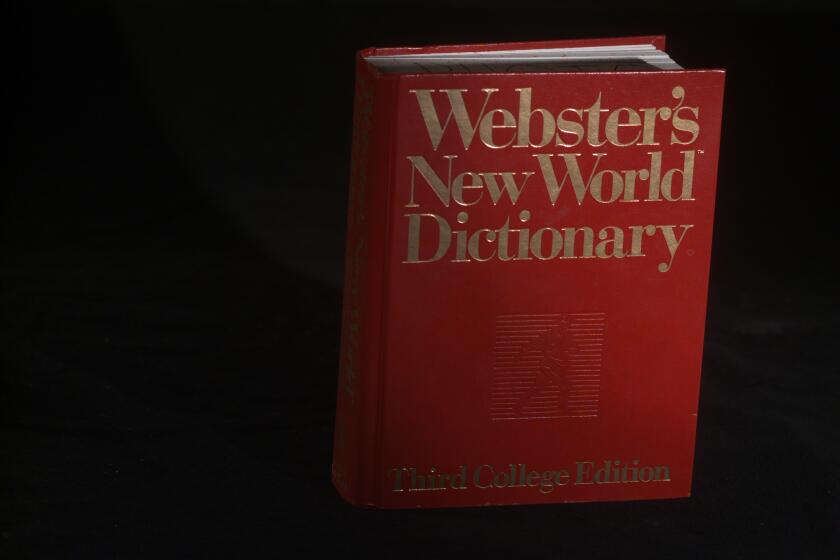A Word, Please: Split infinitives: the mistaken rule with a catchy name

- Share via
Reader Don in Los Angeles County wrote recently with a question about a well-known grammar issue called a “split infinitive.”
“I learned about them 50 years ago and I am somewhat sensitive about them still,” Don writes. “I always see them in everyday writing in The Times and other media. Are they now considered OK to use?”
The short answer is yes, split infinitives are OK to use. The long answer requires us to dig into a little history that shows that, contrary to popular belief, split infinitives have always been OK. But first, a quick primer.
If you’ve ever heard the term “split infinitive,” there’s a good chance you also heard the world’s most famous example, “to boldly go” from the opening sequence of the original “Star Trek” TV series. Here’s the idea: “To go” is an infinitive form of a verb. Think of that as a verb’s most general form. So unlike “goes” which is a conjugated form of “go” that you use with certain subjects like “he goes” and “she goes,” the infinitive “to go” is the basic form — the verb in its most general sense.
If you put something between “to” and “go,” the argument goes, you’re splitting it up. You’re not supposed to do that, they say, therefore split infinitives like “to boldly go” are errors.
That’s not so. For starters, as Merriam-Webster’s Dictionary of English Usage says, the term “split infinitive” is a misnomer, since “to” isn’t really part of the infinitive.
When used to introduce an infinitive like “go,” the “to” part is best categorized as a particle. The infinitive is the word after “to,” also called the base word. And nobody splits those because you’d have to chop a verb in half: g-boldly-o.
But those facts wouldn’t sway a lot of opponents of this structure, who argue that “to boldly go” and other phrasings that put an adverb after a “to” are bad form no matter what you call them. “Bad” is a matter of taste, so that’s a little more difficult to address. But it helps to look at how these so-called splits might work if you put the adverb somewhere else.
A letter from a mistaken reader reminds us of the importance of dictionaries and the arbitrariness of some English usage guides, writes grammar expert June Casagrande.
“I can’t bring myself to really like the fellow” is an example offered in Strunk and White’s “The Elements of Style.” As the authors point out, “really” works best right where it is. The alternatives, “really to like” and “to like really,” are clearly inferior.
Here’s one from Merriam’s: “Floor sweepers were too easily replaced to ever form into a union.” The alternative “ever to form” seems unnatural, and that goes double for “to form ever.”
And here, from “Fowler’s Modern English Usage,” is an example of a four-word adverbial phrase positioned after the “to” particle: “Everything he had written seemed to just deliberately and maliciously draw attention to the fact.” If the writer of this sentence had followed the popular wisdom on splitting infinitives, the result would have been a disaster: “Everything he had written seemed just deliberately and maliciously to draw attention to the fact.”
So if we don’t need a rule to prohibit these “splits,” why were so many kids taught incorrectly about split infinitives, especially in the mid-20th century? “It is quite possible that the enduring popularity of the split infinitive as a subject (of discussion among grammarians) is due to its catchy name,” writes Merriam’s.
The pop culture connection in the “Star Trek” example probably upped the split infinitive’s public profile, too.
For your own writing, you can follow the advice of conservative grammarians who say to avoid these “splits” except when doing so gets too awkward. But if you don’t want to worry about it, even “The Elements of Style” will back you up. As Strunk and White advise in the book: “Some infinitives seem to improve on being split, just as a stick of round stovewood does.”
June Casagrande is the author of “The Joy of Syntax: A Simple Guide to All the Grammar You Know You Should Know.” She can be reached at JuneTCN@aol.com.
All the latest on Orange County from Orange County.
Get our free TimesOC newsletter.
You may occasionally receive promotional content from the Daily Pilot.






